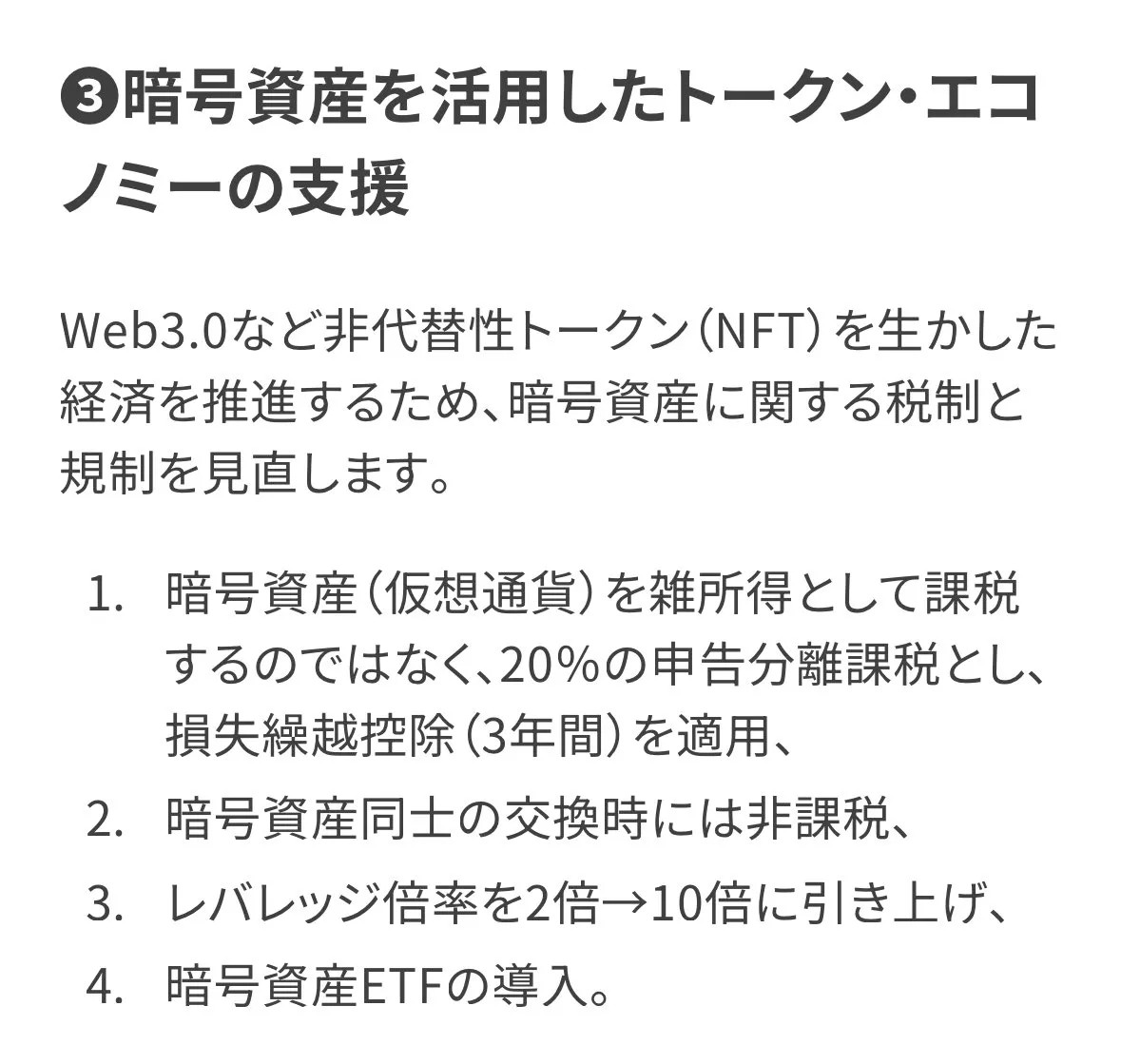Democratic Party for the People (DPP) leader Yuichiro Tamaki has outlined pledges for crypto tax reform in Japan on social media yesterday (JST). He asked digital asset enthusiasts for their support in addressing the nation’s astronomically high cryptocurrency tax rates, and digitizing money.
The political vans are rumbling down the streets once again in both small-town and big-city Japan, poisoning the beautiful October air with their unique brand of noise pollution. However, crypto heads may be paying more attention than usual to the loudspeakers shouting about this year’s general election.
Yuichiro Tamaki, leader of Japan’s Democratic Party for the People (DPP) posted his party’s crypto tax policy to X on October 21st (JST), linking to an official political pledge document.
Tamaki wants votes, and if he gets enough of them, he’s promising to change the current crypto tax system which is at once confusing and unfair in the eyes of many.

Tamaki’s 4-point DPP pledge
The long and short of the crypto tax proposal?
The policy aims to promote the use of NFTs (non-fungible tokens) in governance, introduce a separate 20% taxation system for crypto (currently taxed at up to 55% as miscellaneous income), allow for loss deductions, and exempt crypto-to-crypto transaction events from taxation.
The campaign pledge further states that the DPP wants to increase allowable leverage rates for trading, and introduce cryptocurrency ETFs (exchange-traded funds).

“In addition, we will convert the yen, which is currently legal tender, into an electronic currency, and promote the issuance of ‘digital local currency (tentative name)’ by local governments as a crypto asset that will contribute to revitalizing local economies,” the section concludes.
The airbrushed promises may sound nice, but the current situation for everyday Japanese is anything but easy, with inflation and taxation making it difficult for even retired pensioners to get by.
Tamaki’s proposed 20% rate still guts the original value proposition of bitcoin, which was to opt out of such financial recklessness and waste, and help people like these neglected retirees actually have something to live on.
“Japan is trying to survive by squeezing taxes out of its citizens,” one user of X replied to Tamaki’s post. Still, others were largely supportive, expressing relief at the prospect of finally — just maybe — being able to understand how to report their taxes.
Democratic Party for the People (DPP) leader Yuichiro Tamaki has outlined pledges for crypto tax reform in Japan on social media yesterday (JST). He asked digital asset enthusiasts for their support in addressing the nation’s astronomically high cryptocurrency tax rates, and digitizing money.
The political vans are rumbling down the streets once again in both small-town and big-city Japan, poisoning the beautiful October air with their unique brand of noise pollution. However, crypto heads may be paying more attention than usual to the loudspeakers shouting about this year’s general election.
Yuichiro Tamaki, leader of Japan’s Democratic Party for the People (DPP) posted his party’s crypto tax policy to X on October 21st (JST), linking to an official political pledge document.
Tamaki wants votes, and if he gets enough of them, he’s promising to change the current crypto tax system which is at once confusing and unfair in the eyes of many.

Tamaki’s 4-point DPP pledge
The long and short of the crypto tax proposal?
The policy aims to promote the use of NFTs (non-fungible tokens) in governance, introduce a separate 20% taxation system for crypto (currently taxed at up to 55% as miscellaneous income), allow for loss deductions, and exempt crypto-to-crypto transaction events from taxation.
The campaign pledge further states that the DPP wants to increase allowable leverage rates for trading, and introduce cryptocurrency ETFs (exchange-traded funds).

“In addition, we will convert the yen, which is currently legal tender, into an electronic currency, and promote the issuance of ‘digital local currency (tentative name)’ by local governments as a crypto asset that will contribute to revitalizing local economies,” the section concludes.
The airbrushed promises may sound nice, but the current situation for everyday Japanese is anything but easy, with inflation and taxation making it difficult for even retired pensioners to get by.
Tamaki’s proposed 20% rate still guts the original value proposition of bitcoin, which was to opt out of such financial recklessness and waste, and help people like these neglected retirees actually have something to live on.
“Japan is trying to survive by squeezing taxes out of its citizens,” one user of X replied to Tamaki’s post. Still, others were largely supportive, expressing relief at the prospect of finally — just maybe — being able to understand how to report their taxes.






